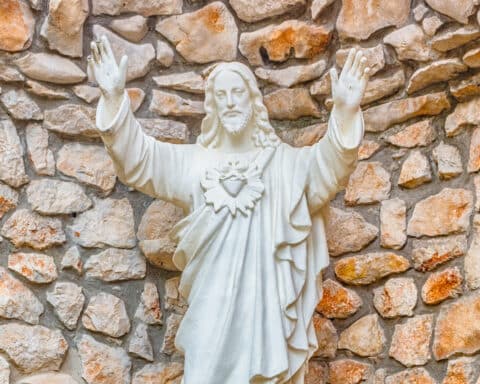This Sunday, we jump right into the middle of a story taken from Matthew 11. In the first lines, Jesus is referring to “hidden things” that are only revealed to “little ones.” We might wonder: What are “these things” to which Christ is referring? And why are they revealed to “little ones”?
Let’s remember what has been happening in Matthew’s Gospel so that the answers to these questions can be revealed to us, and we can hopefully become “little ones.”
| July 9 – 14th Sunday in Ordinary Time |
|---|
|
Zec 9:9-10 Ps 145:1-2, 8-9, 10-11, 13-14 Rom 8:9, 11-13 Mt 11:25-30 |
In Chapter 3 of Matthew’s Gospel, we hear the voice of John the Baptist crying out in the wilderness: “Repent, for the kingdom of heaven is at hand!” (Mt 3:2). In Chapter 6, Christ teaches us to pray the Our Father. And by the time we arrive at Chapter 11, Matthew and the other disciples have been called, John has been arrested, and Christ has been revealing the mercy that constitutes his Kingdom. As we approach Chapter 11, therefore, we have heard the call to repentance and we have been given the means to turn toward Christ: the holiness of John the Baptist, the example of the disciples in heeding Christ’s call, and the prayer in which we ask to be forgiven and to be conformed to God’s will.
In part, then, the “hidden things” of which Christ speaks are “hidden” because they are “little” and easily unnoticed by the world: a voice in the wilderness, the “turning” of a heart, an act of mercy, prayer.
The world, as Christ laments in Matthew 11, desires “deeds of power.” Of course, Christ also does “deeds of power” in Matthew’s Gospel: “the blind receive their sight, the lame walk, lepers are cleansed, the deaf hear…” (Mt 11:4-5). And yet, despite such obvious displays of “power,” the world does not repent. These are deeds for those “with eyes to see.” The world does not see, “the Lord of heaven and earth,” but “a glutton and a drunkard, a friend of tax collectors and sinners” (Mt 11:19).
In contrast, those who repent are the “little ones” of Matthew’s Gospel. The “little ones” are those humble enough to recognize their faults and to pray to God for forgiveness. Only these “little ones” recognize the Hidden One revealed by Christ. The Hidden One is their Father and their king. He is the one whom Christ reveals with his merciful miracles that heal the sufferings of his “little ones.”
Matthew 11:25-30, thus, calls its readers to a conversion from the power of the world to the repentant humility of the “little one.”
We find such an example in the life of St. Augustine (d. 430), famous for his conversion from pride to humility. In fact, Augustine even relied on Matthew 11:25-30 to tell his story of conversion in his Confessions. He tells us how God befriended him, a sinner, burdened with the heavy load of his worldly pride: “You, Lord, are good and merciful, and your right hand plumbed the depths of my death … so that I now willed what you willed … enabling me to bow my neck to your benign yoke and my shoulders to your light burden, O Christ Jesus, my helper and redeemer … Childlike, I chattered away to you, my glory, my wealth, my salvation, and my Lord and God.” Thus, Augustine gives thanks to the “Father, Lord of heaven and earth,” who reveals himself to “little ones.”
Perhaps what is most moving about Augustine’s prayer is his entrance into Christ’s own prayer in Matthew 11:25-30: “I give praise to you, Father, Lord of heaven and earth.” Praying thus with Christ, Augustine’s heart humbly turns with total gratitude to God for becoming a “little one” himself. Christ’s “littleness” reveals the Hidden One, and so Christ even helps us to pray, like children, to Our Father. May we hear his voice, and turn!





